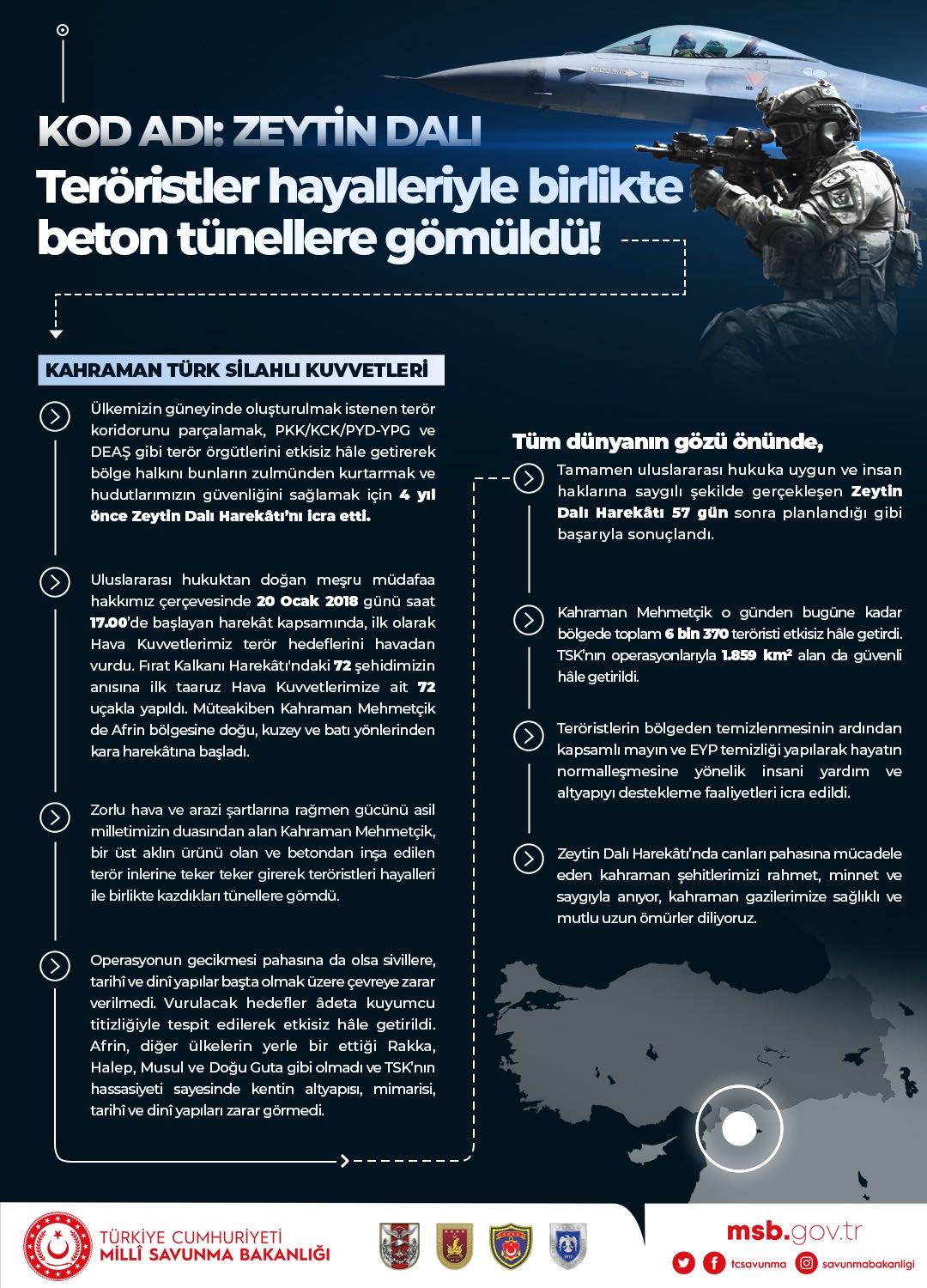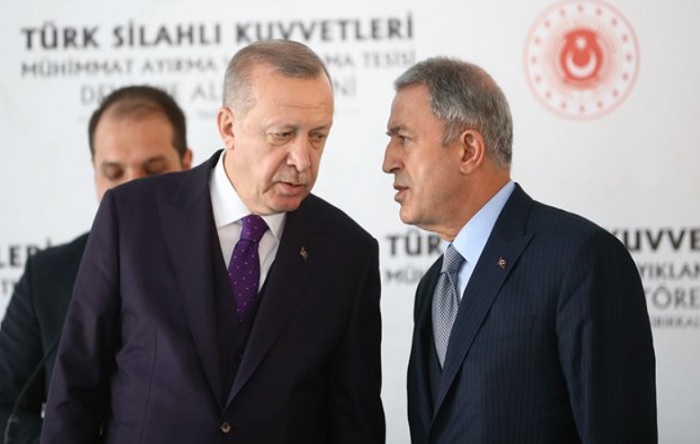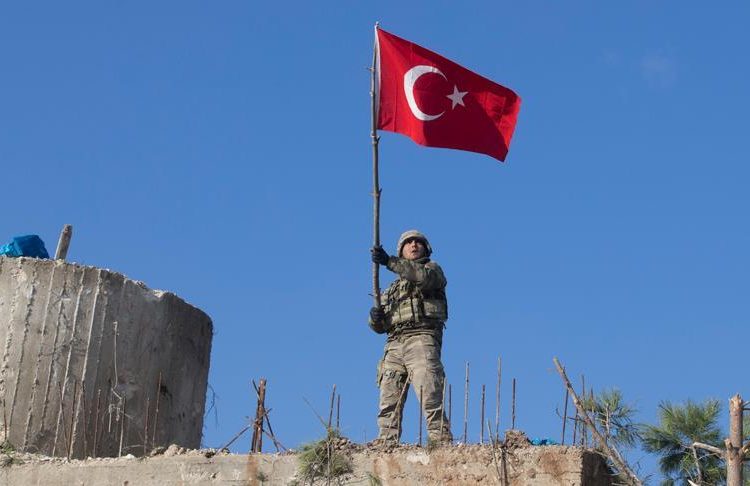Levent Kenez/Stockholm
The Turkish Ministry of Defense published a series of messages on its social media accounts and website on the anniversary of a unilateral military operation called “Operation Olive Branch” carried out in northern Syria against the People’s Protection Units (YPG), the armed wing of the Syrian Democratic Forces (SDF), between January 20 and March 24, 2018. Turkey defines the YPG and SDF as the Syrian branches of the outlawed Kurdistan Workers’ Party (PKK), with which it has been fighting for almost 40 years and designates as terrorist organizations. Commemorating departed soldiers, the ministry claimed that the city of Afrin was liberated from the terrorists in a statement in which France and the US, which allegedly aided the terrorists, were referred to as the terrorists’ “superior mind,” without mentioning them by name.
“Despite the harsh weather and terrain, Hero Mehmetçik [an emotional term used to refer to soldiers of the Turkish Army], who derived his strength from the prayers of our noble nation, entered the terrorist dens, which are the product of a superior mind and built from concrete, one by one, and buried the terrorists with their dreams in the tunnels they dug,” the statement reads.
Turkish President Recep Tayyip Erdoğan has repeatedly stated that the underground tunnels built by YPG militants were made with cement supplied by French industrial giant Lafarge, accusing France of supporting terrorism. Erdoğan also expressed dissatisfaction with the fact that the Americans do not see the YPG as a terrorist organization, as it was frequently mentioned by pro-government media outlets that the tunnels were planned by the Americans. The tunnels were referred to as “French concrete, American engineering.”

The ministry also alleged that even if the operation was delayed, civilians and the environment, especially historic and religious buildings, were not harmed. According to the ministry, the targets to be hit were determined with the meticulousness of a jeweler. Such expressions like “meticulousness of a jeweler” sound quite strange for this kind of statement in Turkish.
“Afrin did not become like Raqqa, Aleppo, Mosul and Eastern Ghouta, which other countries destroyed, and thanks to the sensitivity of the Turkish Armed Forces, the city’s infrastructure, architecture and historic and religious structures were not damaged,” the ministry claimed, referring to allegations that the Americans destroyed many cities in northern Syria and Iraq in its fight against the Islamic State in Iraq and Syria (ISIS)
In September 2020 UN High Commissioner for Human Rights Michelle Bachelet warned that the human rights situation in places under Turkish occupation was grim, with violence and criminality rife.
“I urge Turkey to immediately launch an impartial, transparent and independent investigation into the incidents we have verified, account for the fate of those detained and abducted by the affiliated armed groups, and hold accountable those responsible for what may, in some instances, amount to crimes under international law, including war crimes,” said Bachelet.
According to the Office of the High Commissioner for Human Rights at least 116 civilians were killed in these areas and some 463 injured between January and September 2020 by improvised explosive devices (IEDs) and explosive remnants of war (ERW). Those killed included 15 women, 20 boys and two girls.
The UN organization also claimed that Turkish-affiliated armed groups seized and looted homes, land and other properties without any apparent military necessity and occupied many of them with their own families.
Observers claim that many historic artifacts were damaged in the middle of the conflict, among them the Iron Age temple of Ain Dara in northwest Syria.
Other claims about the region under the control of Turkey are that some factories were dismantled and brought to Turkey and that olive oil in the Afrin region was exported through Turkey. Minister of Agriculture and Forestry Bekir Pakdemirli, in a statement in 2019, announced that the amount of olive oil to be transferred to Turkey would be limited to 600 tons and that this was not a significant amount given Turkey’s 200,000 tons of annual olive oil production. Government officials also stated that the main purpose of bringing Afrin olive oil to Turkey was to prevent its revenue from reaching the PKK. However, olive oil coming from Afrin exceeded 13,000 tons per year according to news in the Turkish media.
It is known that many Turkish businessmen take advantage of the current situation in Syria through illegal trade. For instance Murat Özvardar, the husband of journalist Hande Fırat of CNN’s Turkish affiliate, was accused of plundering an industrial zone in northern Syria. The couple denied the allegations.
According to the Turkish Defense Ministry, 6,370 terrorists were neutralized within four years. Turkish authorities often use the term “neutralize” in statements to imply the terrorists in question either surrendered or were killed or captured. However, there is no opportunity to verify the statistics published by Turkey. Turkey was also criticized for reporting a large number of ISIS militant deaths to prove that it was sincere in its fight against ISIS.

Nordic Monitor previously reported on the nationalist language used by the Ministry of Defense in communications. The ministry, which was a rather boring institution in past years, turned into an effective government body after the government put the General Staff under the supervision of the ministry on July 15, 2018. Undoubtedly, former Chief of General Staff Hulusi Akar’s appointment as defense minister has been influential in the change. For many, Akar is still the de facto chief of general staff, so much so that, unlike previous defense ministers, Akar even had a special uniform prepared for himself. Akar, who managed to establish a command echelon that consists of commanders loyal to him, stands out as the sole arbiter in the military. One of the most influential figures in Erdoğan’s cabinet, Akar is often mentioned in post-Erdoğan scenarios. Since one of the easiest ways of attracting attention and public support in Turkey is using nationalist and religious rhetoric, the Defense Ministry produces nationalist videos and propaganda materials to polish Akar’s image.












